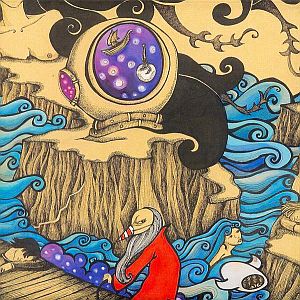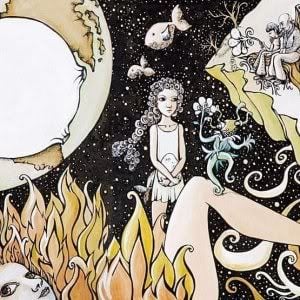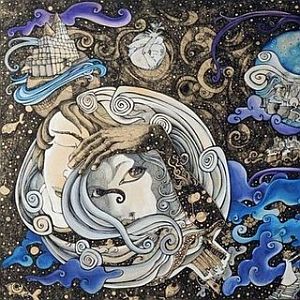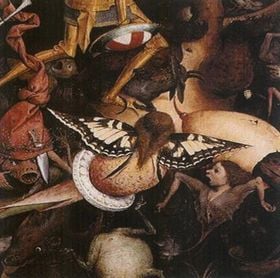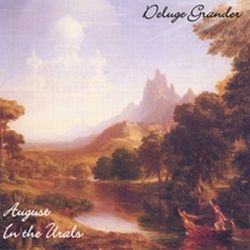I recently sat down for a live interview with Mr. Dan Britton of Birds and Buildings and Deluge Grander fame. The two of us talked about Italian Prog, Opeth, the five or so albums he is apparently working on at the moment, and much more. Be warned, Mr. Britton and I diverged from the topic at hand a few times to talk about stuff that had very little to do with the actual interview. I still find that stuff interesting, though!
Dan Thaler: Thanks for agreeing to this interview. I’d like to start with you telling us something about yourself. Whatever you want, really.
Dan Britton: I am watching a movie called One False Move and listening to The Enid's 'Anarchy on 45'
Dan Thaler: The Enid are pretty good, unfortunately I can't get into much of what they've done beyond In the Region of Summer Stars besides a few albums from that era. Too ambient for me I suppose.
Dan Britton: Yes.. me too! When I read about the Enid, I think "I'm gonna love this band" and when I listen to them, I think "myeh....".
Dan Thaler: You’ve been in quite a few bands over the years. I’m going to start with the first one that I know of, Cerebus Effect. I’m sure a lot less people have heard of this one than have heard of the others. What would you like to tell us about it? I like the music that CE made, which was sort of dark and heavy jazzy material, but the band didn’t last very long.
Dan Britton: Well, they were a band for 3 or 5 years before I ever joined. Their formula was basically: Odd time signatures that everyone sync's up on, and the guitarist and bassist think of their own notes. So, if you know much about music theory, any *two* notes can sound ok together, but when I joined, eager to play actual chords and melodies, it got sloppy unless we actually talked things out. The guitarist and bassist didn't really like talking things out, and I understand why, because discussing musical composition in detail can be tedious. So we were lucky to make the one album, but after that, I think we all knew that it wasn't going to work. I think the album is ok, but it's definitely not my proudest achievement.
Dan Thaler: Deluge Grander is #2, which formed while you were still in CE, but before it disbanded, from what I understand. DG is very different from CE. This time you’ve got very grand and epic symphonic prog. I hesitate to describe it because I find that, in general, your music is difficult to describe, so I just leave it at “symphonic prog”. How would YOU describe Deluge Grander?
Dan Britton: Symphonic prog is sufficient, IMO. The thing about Deluge Grander is that Patrick the drummer and Dave the guitarist don't have much in common as far as what they like to listen to. Patrick likes mostly heavy and complex stuff, and Dave likes Phish and jam-band stuff, though they're both into other stuff too. So part of the challenge with Deluge Grander is for me to write stuff that they will each enjoy, since people are generally most likely to play well on something they like. So I guess that means if you cross Phish with Spastic Ink, you get symphonic prog!
Dan Thaler: Honestly I feel like "Symphonic prog" is one of those things that's hard to define, yet "you know it when you see it"
Dan Britton: Well, there are some obvious superficial things like mellotrons, lead analog-sounding synthesizers, and an obsession with 7/8 that characterize it. But generally, I think it's attention to composition rather than improvisation that differentiate symphonic prog from prog in general.
Dan Thaler: Are there any plans for a third Deluge Grander album at any point in the future?
Dan Britton: Why yes....but it's complicated. We are tentatively planning on releasing FOUR different albums, but pressed only in VINYL format, and probably in limited editions of 200 or less, possibly with hand-made artwork for each individual copy... And then we'll take some of the material from these four albums, and make TWO CDs, possibly with nice packaging as well. And then we'll take the very best of everything and make ONE super-incredibly-good album, and maybe release it for free (and in CD form too). So it's a ridiculously complicated scheme, and it might not work out at all, but those are the plans. I've got plenty of sketches for the material on those four vinyl albums already.
Dan Thaler: That does seem pretty overwhelming! I definitely wasn't expecting something on such a grand scale.
Dan Britton: Yep, one of the hardest things is deciding what order to release the stuff. I think we'll try the first record, and see how it goes. If only three people in the whole world are willing to pay $50 or whatever we charge for it, we might just drop the whole plan altogether.
Dan Thaler: How do you see the first two albums compared to each other?
Dan Britton: I think the second one is more "classical" than the first, and also a bit more "unified" in that there is an idea or philosophy that unifies the music and the artwork.
Dan Thaler: What would you say that theme is?
Dan Britton: Well, I don't want to give too much away, but it's about ostensibly divergent paradigms (modernity vs. the Luddites, for example) unifying, to everyone's surprise.
Dan Thaler: Sort of like trying to identify what "good" is, in an aesthetic sense, perhaps? "The form of the good"? I dunno, that just came to mind, since it’s the title of the album and all.
Dan Britton: In a way, yes. Of course, there's nothing too specific I'm trying to get across, since there aren't any lyrics or anything. "Art Rock" in a very literal sense I suppose.
Dan Thaler: Birds & Buildings, the final project I know of, is probably my favorite of the three, which might be because I’m a huge fan of jazz. Tell me about this project. The music is similar to that of DG’s, but darker and, as I said before, jazzier.
Dan Britton: Yep. Malcolm the drummer is more of a DC-punk kind of drummer, but he's got an absolutely incredible mind for drumming. Brian the sax player is pretty much "Mr. Jazz" and doesn't really like "prog" very much, and he's never heard David Jackson or Mel Collins or Ian McDonald, which everyone compares him to. So those two guys and their reactions to the stuff I write determine how Birds and Buildings turn out.
Dan Thaler: Make sure to play some VDGG for him immediately! (one of my favorite bands)
Dan Britton: Well, Brian sadly doesn't really like prog all that much. And Malcolm HATES VDGG. (I like them of course)
Dan Thaler: You did an interesting thing with the cover art of this album, that is, taking it from a section of Genesis album’s cover art which had actually taken its artwork from a painting titled The Garden of Earthly Delights. Is there any particular reason you did this? Personally I find the idea of a small section of a painting that had already been taken from a larger painting to be pretty funny.
Dan Britton: Yes, but I really wish I had used a better version of the artwork. The CD cover looks pretty blurry. I really like all the old Hieronymus Bosch art. In fact, a few months after I joined Cerebus Effect, I tried to convince them to change the name of the band to "Hieronmyus." That portion of TGOED has birds in it, and what looks like a building of some kind, so it seemed like a good choice.
Dan Thaler: I read on B&B’s myspace that there’s going to be a new album out soon, but I haven’t seen any more word on that. Would you like to tell us something about “Multipurpose Trap”? How’s it looking so far?
Dan Britton: I have actually been working on it quite a lot over the past week. It does move further in the "jazz" direction, and I think it also sounds a bit more American (and less European) in general. The first album is pretty tough to follow, but I think this one will at least be executed a little better (recording quality, etc.), even though there might not be as much intensity as there was on the first album.
Dan Thaler: Is there a tentative release date in mind?
Dan Britton: Hopefully before the end of 2010.
Dan Thaler: You say you like to create music based on the tastes of the individual members of the band. That seems like an interesting way to go about the creation process that seems to inevitably bring forth something eclectic. Do you see this process as unusual, or do you think other bands work in similar ways?
Dan Britton: Well, I'm the main composer for these bands, and I think most composers in bands know that people play better when they're playing music they like. So I don't think it's too different from bands where one guy does most of the writing. But I'm not sure.
Dan Thaler: I heard somewhere that you were starting another project, but I can’t remember where, and I can’t remember what. Am I crazy, or are you actually starting another project?
Dan Britton: Well, there's a group/project called "All Over Everywhere" that is about to release it's first album in a few months. This stuff is less proggy, but still pretty densely arranged at times. Then there's Elevator Machine Room with Chris Mack of Iluvatar/Oblivion Sun/Puppet Show fame. He and his wife just had their second kid, so we haven't rehearsed in a while, but we have enough material for an album, which I think will be a very good one.
Dan Thaler: I mentioned the artwork of B&B, but I’m also curious about the artwork of Deluge Grander. The covers both look very distinct and surreal. I would imagine they were done in the style of an early Genesis album cover, since I know you’re a fan. Am I right? Also, who painted (I assume they were painted) them?
Dan Britton: Well the first cover we nicked from Thomas Cole, who died many years ago. Unfortunately, just after it was released I found out that a metal band called Candlemass had used the same cover! Kezia Terracciano did the art for the second DG album. She also did the picture for "Inaugural Bash" and "The Solitude of Miranda" on the first DG album, and all the inner art for Bantam to Behemoth. She lives in Italy, and I've never met her. But I suspect that any similarity to Genesis' album covers is purely coincidental. Though I admit I do love those old Whitehead sleeves. Forgot to mention... I actually gave Kezia some very detailed instructions for all this artwork. If you look at the art in BAB BTB and DG TFOTG, you'll see some clues for what are two complicated little puzzles of art.
Dan Thaler: I'll make sure to scrutinize them very carefully later.
Dan Thaler: While your bands all sound very different, I happen to think there’s a common thread that combines elements of Genesis, Yes, King Crimson, and various other “First Wave Prog” bands with touches of Marillion, Porcupine Tree, and other things. Just kidding, I actually read recently that you hate it when reviewers do nothing but compare music to those that are generally “held sacred”. Well, I personally completely agree with you, but I would love to know some of your influences anyway.
Dan Britton: I think my main "influences" are Genesis (the chord sequences), Magma (the intensity of repetition and occasional dissonance), and Gentle Giant (the complexity). Now there's a lot of other music I like, but those three probably did affect how I write music. I am trying to branch out, though, and I think this new All Over Everywhere album will be regarded as a big change. And there is some stuff on the forthcoming second Birds and Buildings album that's almost like rap or techno music. Though not in a bad way, I hope.
Dan Thaler: Would you say that there are any particular prog “movements” you’re a fan of such as the Italian Progressive Rock Scene or the Canterbury Scene? I mention those because I'm a huge fan of both the former a bit moreso than the latter.
Dan Britton: Oh, yes, I am heavily into the Italian prog stuff... And now it's to the point of "completing the collection"... I haven't really liked the last 10 or 20 Italian prog CDs I've bought, yet I keep buying them because I guess I just like the whole vibe. While I like the Canterbury scene in general, the music doesn't have the same impact on me as most 1970's prog.
WARNING: DIGRESSION FROM THE INTERVIEW!
Dan Thaler: Have you listened to Latte e Miele? they're one the bands I've been listening to the most recently. Their third album is definitely my favorite, especially because of "Pavana".
Dan Britton: Yes! I actually like their first and third albums more than Papillon. I'm curious about the new Marco Polo one, but a lot of the 1970's reunion acts don't seem to have the same magic as they did in the 1970's. There are a couple of really nice laid-back poppish tunes on Side One of Aquile E Scoiatelli as well. They almost remind me of a proto-Porcupine Tree in a way. Actually DG almost played an "Italian prog" medley at Progday. But I'm the only one in the band who really likes that stuff, so we didn't do it.
Dan Thaler: I would recommend you try "Marco Polo". It isn't very similar to their other albums, interestingly, but it's still very good. Almost reminds me of Banco with a different singer.
Dan Britton: Unfortunately it's always sold for $19-30 on CD…
Dan Thaler: Yeah, imports... Still, didn't stop me. What was DG going to play in the medley?
Dan Britton: IIRC it was the opening piano bit from LDF, then a couple of Semiramis riffs, a 5/4 bit from BdB's YS (and I was going to actually sing in Italian), then a portion of a track by Modry Efekt (not Italian, but one of my favorite groups), then a bit from the last track on Reale Accademica di Musica's album, then the ending of Zarathustra.
Dan Thaler: Nothing of the "big three", eh?
Dan Britton: That's correct. It just seems more fun to do the less prolific bands, since that's what was so special about Italy.
Dan Thaler: Fair enough, though Banco is still my favorite!
Dan Britton: I actually like their late-1970's work much more than the first three albums.
Dan Thaler: I can't say I like them more, but I do really enjoy Cando Di Primavera, Di Terra, etc. Anyway, we digressed a bit, I hope you don't mind.
Dan Britton: Not at all, still on topic though, right? My influences and all…
Dan Thaler: Of course.
Dan Britton: So is there any Italian prog you find overrated?
Dan Thaler: I would say Chocolate Kings by PFM.
Dan Britton: Because for me there's one big one...
Dan Thaler: But tell me yours.
Dan Britton: For me it's Osanna's Palepoli. Chocolate Kings is ok if you get past the vocals.
Dan Thaler: Honestly I didn't know it was rated incredibly highly. Yes, the vocals are the problem, but the musicality is still top-notch. I agree about Palepoli, but I love the album Osanna released last year with Dave Jackson.
Dan Britton: And isn't it funny that apparently PFM thought Lanzetti would help them break English and American radio with that warbly voice?! I actually think Mussida, Premoli, and di Cioccio are all great singers already.
Dan Thaler: Maybe they figured since he sounds sort of like Peter Gabriel. I agree, I never had a problem with the singing.
Dan Britton: You know, that's one thing I don't hear, though everyone seems to say it. He sounds like Family's Roger Chapman, not PG. To me, at least.
Dan Thaler: I've always thought he sounded like PG to me, but I don't like either of them, personally.
Dan Britton: Really, you don't like PG's singing?
Dan Thaler: I don't like Genesis in general, actually.
Dan Britton: Shock, gasp, disbelief!
Dan Thaler: I have a feeling the blog is going to get a lot of hatemail from ProgArchives now. Well, I'll also say that I dislike Yes and Pink Floyd!
Dan Britton: Well, you know it's actually refreshing to hear that for once.
Dan Thaler: Though I love VDGG, Jethro Tull, Gentle Giant, and King Crimson.
Dan Britton: I was about to say "Are you sure you like prog at all?" You seem to gravitate towards the more obscure stuff.
Dan Thaler: I get that a lot.
Dan Britton: It does make it more fun to like a band when no one knows about them.
Dan Thaler: I suppose so. I dunno, I used to enjoy Genesis and Yes slightly, but they never did much for me. It's hard to call Jethro Tull obscure anyway, they're probably the most popular band that could be considered "prog".
Dan Britton: Well Pink Floyd is probably more popular, though less prog.
Dan Thaler: Yeah, I didn't think about that. I honestly never even consider them to be a prog band.
AND NOW BACK TO YOUR REGULARLY SCHEDULED INTERVIEW:
Dan Thaler: If you could work with any of your contemporaries, who would it be? Andy Tillison? Roine Stolt? My colleague says he’s seen you say that you’d like to work with Mikael Akerfeldt.
Dan Britton: Well, yeah, but I doubt anyone as successful as those guys would want to work with me! I actually met Roine Stolt for a minute or two after DG opened up for Karmakanic/Agents of Mercy at Orion last year. Sometimes, admiring someone else's music doesn't necessarily mean a collaboration would be artistically successful or even enjoyable. The best way to collaborate is to actually compose and arrange something collectively, several hours a day, for at least a few weeks, and that is extremely difficult to organize when the rewards for a job well done are so small.
Dan Thaler: Tell us about the types of keyboards/pianos you use. Do you have a “rig” or just a big bunch of random keyboards? By the way, you had better not say you have a Hammond organ, because if you do, I would like to know why you haven’t based at least one entire album’s worth of material around it. Since it’s the greatest instrument ever made, you know (to paraphrase Arjen Lucassen).
Dan Britton: I just have two 88-key keyboards (a Yamaha T120 and an Alesis Fusion), both manufactured post-2000, so not at all vintage. I do have a Univox analog synth from 1974 that I actually found by the side of the road one day, covered in snow. And it works!
Dan Thaler: Seems strange that someone would throw it away...
Dan Britton: Yes. It was very weird to find that. And it was as I was recording parts for the first Deluge Grander album, so it couldn't have come at a more serendipitous time.
Dan Thaler: You seem to be a fan of these sort of “downtuned”, eerie vocals, as they’re in a lot of your albums. It almost reminds me of the vocals on Camel’s Mirage, how they only pop in for a few lines of quick verse amongst the long instrumental sections. They even sound a bit similar. I think this comparison to “old prog” is justified, by the way.
Dan Britton: Actually, funny you mention that. For the second Birds and Buildings album, I'm planning to have singing on every single song, but not by me, and not for more than about 1 minute per track. I don't know why people seem to think if there are going to be vox on a song; they have to stay around for a few minutes. For this music (the new BAB stuff), there are only a few small portions of each track where vocals would work at all, so it makes sense to just put them in when they work, but not feel obligated to have them when they're not helping.
WARNING: MORE DIGRESSION!
Dan Thaler: My colleague Nick wants me to ask you what your favorite Opeth song/album is.
Dan Britton: The first two tracks on Ghost Reveries knock me out every time I hear them.
Dan Thaler: The Lotus Eater on Watershed does that to me. That keyboard section, it's like "a jazzy Canterburyesque riff in death metal!?"
Dan Britton: I'm actually not a big fan of the first 3 or 4 Opeth albums. It amazes me when some people say they like those albums more than the recent stuff.
Dan Thaler: Honestly I like most of them equally except for Damnation and Blackwater Park. I find both of those to be boring. Well, Watershed is my favorite, but after that the rest are mostly equal to me.
Dan Britton: Really, Blackwater Park boring?
Dan Thaler: I don't know what it is either, something about it seems... off... The Damnation thing is weird too, because I usually can't stand death metal. So it's weird that their least heavy album is my least favorite.
Dan Britton: I wonder if you're just a subconscious contrarian. Because I'm like that sometimes.
Dan Thaler: Oh, I think I am.
Dan Britton: I'm telling you, you'd like old Genesis... But just pretend no one else has ever heard them :-)
Dan Thaler: I've listened to old Genesis :P Quite a lot. I can't stand any album but Selling England by the Pound, and even on that album, I can't stand the vocals.
Dan Britton: That's amazing. So are there any vocalists you like? Banco's guy, I suppose?
Dan Thaler: Banco's guy is ok, but I prefer the keyboard sections in that band. I really love Hammill, Ian Anderson, Rikard of Beardfish, Andy Tillison. Akerfeldt is pretty good too. But I listen to a lot of jazz, which is instrumental of course.
Dan Britton: I guess you just prefer instrumental music in general.
Dan Thaler: Al Di Meola, Bo Hansson (listening to him right now), all that good stuff…
Dan Britton: Do you know Kenso?
Dan Thaler: I've heard of them. Japanese jazz fusion?
Dan Britton: Sort of... you might really like their second album, called "II". Most of the rest of their stuff is a bit safe, but that album, especially the first song "Sora na Hikaru" (or something like that) is incredible. That track is probably my favorite instrumental piece ever.
Dan Thaler: I'll definitely check them out. They're actually on my list of bands to check out. I'll bump them up now that you've mentioned them.
Dan Britton: Have you ever heard Woody Herman's version of "Freedom Jazz Dance"? (Don't laugh)
Dan Thaler: I can't say I have.
Dan Britton: It's actually unbelievably good. People laugh at the mention of Woody Herman's name, but he actually did some fun and intense stuff in the early 1970's.
Dan Thaler: His name sort of rings a bell, though I'm not sure who he is. I'm listening to it on Youtube, it's very good. I actually have Miles Smiles by Miles Davis, which has this track.
Dan Britton: He's a clarinet player who was big in the 1940's, then one of his managers committed tax fraud, and poor old Woody spent most of the rest of his life playing and recording to pay off the money he owed the IRS.
Dan Thaler: This track sounds like it could have been made by Weather Report in the 70's.
Dan Britton: IMO Miles Davis' music was good mostly because of the other people on it.
Dan Thaler: You could say his talent was picking good musicians then :P IMO what he inspired was more important than what he recorded. The era of jazz fusion, for example, there would probably be no Return to Forever or Mahavishnu Orchestra if not for him or Weather Report, for that matter.
Dan Britton: Sort of a visionary kind of guy....but a bit overrated and overrevered in general.
Dan Thaler: Yes, Davis is a good example of one who is both over and underrated simultaneously.
Dan Britton: Well, I think McLaughlin and Shorter and Jaco would have still made good music, more or less similar to what they did, regardless of Miles Davis.
END OF DIGRESSION PART TWO!
Dan Thaler: What are your plans for your record label, Emkog? Do you think you’ll use it to release albums by other bands?
Dan Britton: It will probably just be a label for stuff I'm involved with.
Dan Thaler: Last serious question. I’m sure there’s something I’ve forgotten to ask that I will remember tomorrow, but for now I think I’m done! Is there anything you’d like to add?
Dan Britton: No, I guess that's it. If you think of anything else, I'd be happy to respond by email. Thanks for the interview!
Dan Thaler: Of course! I have one last question though, but it has nothing to do with anything.
Dan Britton: Ok, let's hear it.
Dan Thaler: I ask this to everyone I interview because I love dogs. Do you have a dog?
Dan Britton: Nope, sorry. But I'm not anti-dog.














